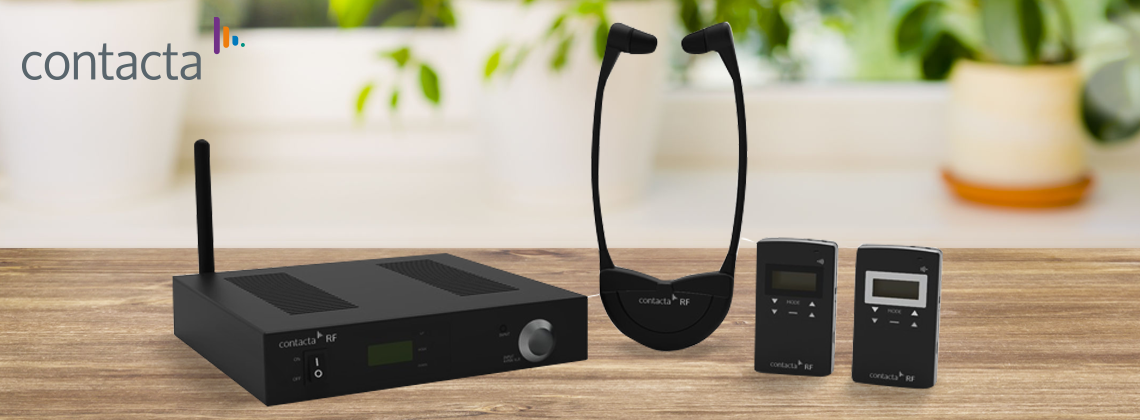Contacta reveals new RF Assistive Listening Systems
Contacta has released its brand new range of RF Assistive Listening Systems - a wireless alternative to Induction Loop Systems.
Available now from main UK distributor CIE, Contacta has released its brand new RF Assistive Listening Systems for 2019.
Radio Frequency systems are ideal for sending signals through walls and to wirelessly transmit sound sources across large areas they are also ideal for tour guidance, meetings and conferences.
These systems can utilise 40 channels simultaneously whilst providing a range of 300 metres.
What are the benefits of RF Assistive Listening Systems?
Unlike the traditional Induction Loop System, RF Systems have no cables, they instead use wireless radio wave signals.Another benefit is that it can be used in areas where the IR systems can not, it can also be used to link rooms up together.
Transmitters and Receivers
Charging Equipment
Accessories
Why do we need Assistive Listening Systems?
Since the revision to BS 8300 Code of Practice in 2018, Assistive Listening Systems are now legally required in any public place that hearing impaired members of society is given the same opportunity to hear messages, speakers, or any other sound as clearly as anyone else.
These standards were introduced to not only ensure quality, but to discourage facility operators from installing bad quality systems which do not function as intended in an attempt to comply with legislation whilst reducing costs.
What is the BS 8300 Code of Practice?
BS 8300 is a British Code of Practice that sets out the requirements of how buildings should be designed, constructed and maintained to meet the needs of disabled people as well as create an accessible and inclusive environment for them.
BS 8300 is in place to ensure everybody has access to enter, to use and to exit a built environment open to the public equally. This is aimed particularly at the diasbled, elderly or those less able to stand.
What types of assistive listening technologies are there?
There are three main assistive listening technologies:
- RF (like the above)
- Audio induction loops
- Infra-red
Each of these have positive and limiting factors which suit specific applications.
What are RF Assistive Listening Systems?
RF assistive listening systems provides sound reinforcement to hard-of-hearing persons with, or without, hearing aids.
In an RF assistive listening system, the sound is transmitted via radio frequency to a receiver and headphones. It may also deliver the sound directly to a receiver connected to a cochlear implant or telecoil hearing aid. The RF system can be used in small or large spaces, however it is not ideal in situations where privacy is necessary because the signal isn’t contained like an IR system. People often use this low-cost system in: classrooms, public meeting spaces, churches, conference rooms, and nursing homes.
What are Infrared Assistive Listening Systems?
Infrared Assistive Listening Systems are an audio technology with supports improved hearing and communication for people with a hearing impairment.
Developed as a wireless alternative to Induction Loop systems, Infrared assistive listening systems work by converting an audio source into infrared light; this is then wirelessly tansmitted to users via an infrared signal. The infrared receivers (worn by users) then convert this light back into audio, which provides a clear and simple listening experience for hearing impaired audience members.
IR systems are ideal for when a sound source needs transmitting to multiple receivers, when confidentiality is required in small spaces or when ambient noise needs reducing.
What is an Induction Loop System?
Induction Loop System is an audio technology with supports improved hearing and communication for people with a hearing impairment.
Audio Induction Loops; sometimes also referred to as Hearing Loops, Audio Frequency Induction Loops or AFILS, offer an assistive listening system for people affected by forms of hearing impairment, particularly those who use a hearing aid or cochlear implant.






.png)
.png)
.png)
.png)
.png)
.png)
.png)

.png)

.png)
.png)
.png)
.png)







